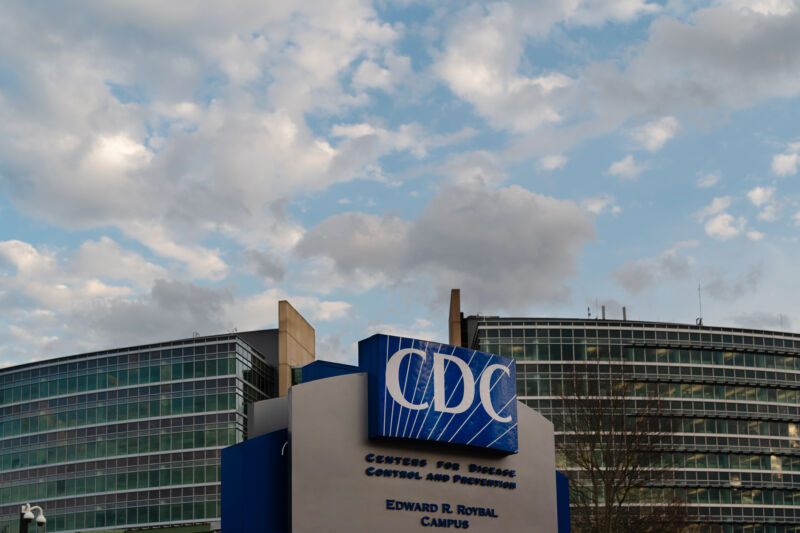
/ The Centers for Disease Control and Prevention (CDC) headquarters stands in Atlanta, Georgia, on Saturday, March 14, 2020.
COVID-19 vaccines are largely holding up against the hyper-transmissible delta coronavirus variant, particularly when it comes to preventing severe disease and death, according to three studies published Friday by the Centers for Disease Control and Prevention.
Overall, fully vaccinated people are about five times less likely to become infected with delta, 10 times less likely to be hospitalized with COVID-19 from delta, and 11 times less likely to die from the variant, according to the studies.
The fresh data lands just a day after President Biden announced sweeping vaccine mandates—the administration’s most aggressive action yet to push vaccine holdouts into getting the life-saving shot. About 80 million Americans eligible vaccination have yet to receive the free and readily available shots. Meanwhile, delta has spread across the country like wildfire since June, leading to one of the largest COVID-19 surges yet in the pandemic. Currently, the US is seeing nearly 150,000 new cases every day, with 100,000 hospitalizations and over 1,500 daily deaths—almost all of which are preventable with vaccination.
Holding up
Though the rise of delta has raised concern that vaccine effectiveness would take a dive, the data suggests the shots are holding up quite well. Existing vaccines’ effectiveness against infection has dropped some with the delta variant’s dominance, but vaccination still offers potent protection—both from hospitalization and also from actually dying from the disease.
In one of the three studies, public health researchers looked at data from over 600,000 adult COVID-19 cases in 13 US jurisdictions over two time periods: a pre-delta period from April 4 to June19, and a post-delta period from June 20 to July 17. The researchers then calculated age-standardized ratios of cases, hospitalizations, and deaths between fully vaccinated and unvaccinated in the each of the two periods.
In terms of infections, fully vaccinated people were about 11 times less likely to get an infection in the pre-delta period, compared with the unvaccinated (with a 95 percent confidence interval of 7.8 to 15.8). That ratio dropped to 4.6 less likely in the post-delta period (with a 95 percent confidence interval of 2.5 to 8.5).
For hospitalizations prior to delta, fully vaccinated people were 13 times less likely to wind up in the hospital than the unvaccinated (confidence interval of 11.3 to 15.6). After delta, that ratio dropped slightly to 10 times less likely (confidence interval of 8.1 to 13.3). The fully vaccinated were 16.6 times less likely to die of COVID-19 prior to delta (confidence interval of 13.5 to 20.4) and 11.3 times less likely to die after delta (confidence interval of 9.1 to 13.9).
The findings are “consistent with a potential decline in vaccine protection against confirmed SARS-CoV-2 infection and continued strong protection against COVID-19–associated hospitalization and death,” the study authors concluded.
When they further fleshed out the data, accounting for vaccine coverage during the two time periods, the authors calculated rough estimates of how vaccine effectiveness changed in the two intervals. For vaccine protection against infection, they estimated that effectiveness dropped from 91 percent to 78 percent with delta. For protection against hospitalizations, effectiveness appeared to go from 92 percent to 90 percent, and for death, from 94 percent to 91 percent.
Hints of trouble
One troubling note was that the declines in protection were more pronounced in older age groups, with those ages 65 and older seeing larger drops.
This finding was echoed in a second study out from the CDC Friday, that looked at nearly 33,000 adult COVID-19 cases from hospitals, emergency departments, and urgent care clinics. In that analysis, post-delta vaccine effectiveness against hospitalization appeared to be about 86 percent overall. However, when the researchers split up the data by age, vaccine effectiveness against hospitalizations was 89 percent among people ages 18 to 74, but only 76 percent among people ages 75 and older.
In a third, smaller study involving just over 1,000 people at five Veterans Affairs Medical Centers, researchers again saw an age-based dip in vaccine effectiveness against hospitalization. Overall, vaccines appeared about 87 percent effective at preventing hospitalization amid delta. Protection from hospitalization was an exceptional 95 percent for people ages 18 to 64—but only 80 percent for those ages 65 and older.
For now, it’s unclear if the drops seen in the studies are due to the power of the delta variant itself, a weakening of protection over time from initial vaccination, or a little of both. Regardless, the data released today will likely be critical in upcoming decisions about the timing and availability of booster shots in the US.
The Biden administration has announced that it is prepared to offer booster doses to all Americans ages 12 and up starting the week of September 20. But, the Food and Drug Administration has yet to sign off on boosters—and reports have already surfaced of internal frustration at the regulator over the administration’s preliminary plans. Additionally, the CDC advisory committee that sets official guidance on the use of vaccines does not have another meeting scheduled until September 29, drawing further questions about the looming booster decisions.